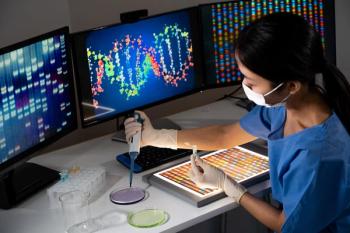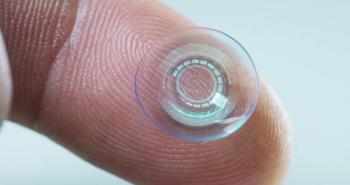
AAOpt 2023: Empower patients by meeting their visual information needs
Over a dozen visual tests help clinicians identify patients who might benefit from vision therapy.
Marc B. Taub, OD, MS, FAAO, FCOVD, FNAP, co-lead a visual information workshop with Pamela Schnell, OD, FAAO, and Melissa Zarn Urankar, OD, FAAO, during the 2023 American Academy of Optometry annual meeting in New Orleans. He sat down with Optometry Times®' editor Kassi Jackson to share highlights from the workshop.
Editor's note: This transcript has been lightly edited for clarity.
Kassi Jackson, Editor:
Hi everyone, I'm sitting down with Dr. Marc Taub, who's co-leading a visual information workshop with Drs. Pamela Schnell and Melissa Zarn at the American Academy of Optometry meeting this year in New Orleans. Thank you for joining us. Dr. Taub.
Marc B. Taub, OD, MS, FAAO, FCOVD, FNAP:
Thank you for having me.
Jackson:
Can you please share with us an overview of the workshop?
Taub:
Yeah, so this workshop is for novice and seasoned clinicians [and] is going to cover the concept of—as the title says—visual information processing. Which is kind of an interesting label, because everything we do in the visual system is visual information processing. So it starts, obviously, at very young ages, but it also impacts patients who have had a traumatic—or an acquired—brain injury.
We will cover concepts like laterality and directionality, hand-eye coordination, some auditory processing—because vision is so intimately linked with the other senses. It's going to be a little bit of hands on, where we split into groups, and you actually get a hands-on time to look at about 15 different tests of visual information processing, some of which you may have learned in school—every school is a little bit different, but we're hoping to really introduce you to some new concepts, and some new tests that maybe you haven't seen before.
Jackson:
That sounds really great. What do you hope attendees take away from the workshop?
Taub:
Well, you know, as I said, it's for novices, but it's also for the seasoned clinician that may have learned these tests a long time ago. So it's just kind of a little bit of a reminder that these tests exists. And these are things that can impact the patients in your chair; it can impact learning, it can impact—with brain injury patients, getting back to the quality of life that they wish to get to. But then it also helps identify patients that can benefit from vision therapy for these issues. Those are the patients that we we deal with in our clinic.
Jackson:
And why is this important for optometrists to address?
Taub:
So much of learning comes through the visual system. If the eyes are not necessarily tracking properly, if they're not converging properly, accommodating properly—that kind of is a different, a little bit of a different topic—but you're not going to get the the information in properly.
You've heard the term, "garbage in, garbage out," and if we're not getting that information in, then getting it back out, interacting with the world doing things like sports and different professions where there's a need for fine tracking for fine hand eye coordination.
And going back to learning, we've all seen patients who are on individualized education plans, or learning is a challenge for them, these are the kinds of patients that we can help and this is the type of workshop that will hopefully get you kind of kick started down that road.
Jackson:
Yeah, and building off the patient side of things. What does this mean for patient care?
Taub:
Well, because patients are more than just eyeballs—they are whole human beings—we have to look at how the visual system impacts working, learning, sports—all of those different things. Because those are things that are not necessarily developed properly in many patients, but they are learned.
Just like you learn to read, you learn to process information; you're not born with that ability to process information. So that is something that that we can work on with our patients and help them in school and work and help them succeed in life.
Jackson:
Is there anything else you'd like to add that we haven't touched on?
Taub:
No, this is a wonderful workshop; we have so much fun doing it. And, you know, there are some topics that 2 hours can feel like a lot of time. This is, for us, one of those topics that you just kind of looked down at your watch and 2 hours just flew by. It's a lot of fun; a lot of hands on experiential learning.
Jackson:
Awesome. Well, Dr. Taub, thank you so much for your time today.
Taub:
Thank you so much. I look forward to seeing you next week.
Newsletter
Want more insights like this? Subscribe to Optometry Times and get clinical pearls and practice tips delivered straight to your inbox.















































